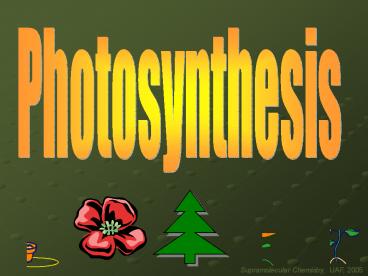Photosynthesis - PowerPoint PPT Presentation
Title:
Photosynthesis
Description:
Photosynthesis What is photosynthesis? In the process of photosynthesis, plants convert the energy of sunlight into the energy in the chemical bonds of carbohydrates ... – PowerPoint PPT presentation
Number of Views:368
Avg rating:3.0/5.0
Title: Photosynthesis
1
Photosynthesis
2
Photosynthesis
Where does the energy come from that sustains all
life?
The Sun!!
Well most of it anyway
3
What is photosynthesis?
- In the process of photosynthesis, plants convert
the energy of sunlight into the energy in the
chemical bonds of carbohydrates-sugars and
starches.
4
Discovery of the process
- For many years, people wondered how a few
seedlings could develop into a large tree. - The mass of seedlings are only a few grams, where
as the mass of a tree is several tons. - Dutch physician Jan Van Helmont devised an
experiment. - He concluded that the mass grew from the water,
because that was the only thing he had added to
the pot. - This was just one of the things needed for
photosynthesis to occur.
5
What makes photosynthesis complete?
- Helmont did not realize that carbon dioxide in
the air also plays a major role in the
contribution of mass growth. - The carbon in carbon dioxide is what is used to
make carbohydrates in photosynthesis.
6
- Later on, scientist Joseph Priestly performed an
experiment that would give rise to why oxygen is
released in photosynthesis, and why sunlight is
needed for it to photosynthesize. - Priestly placed a candle in a jar along with a
mint plant. - He then realized that the candle could only stay
lit when the mint plan was present. - This would mean that the plant was releasing
oxygen.
7
Why is Photosynthesis important?
- Through experiments, it was realized that in the
presence of light, plants transform carbon
dioxide and water into carbohydrates and release
oxygen. - Plants that are able to use a source of energy,
such as sunlight, to provide food directly from
simple inorganic molecules are known as
autotrophs. - This is made possible through photosynthesis.
8
Quick Concept Check
- WHAT IS THE DIFFERENCE BETWEEN A HETEROTROPH AN
AUTOTROPH?
9
the equation for photosynthesis is
LIGHT
Carbon Dioxide
Glucose
Oxygen
Water
LIGHT
6 CO2
6 H2O
C6 H12 O6
6O2
10
The sugars that result from photosynthesis are
produced by adding the hydrogen ions and
electrons from water to carbon dioxide, NOT by
splitting CO2 and adding water!
oxidized
H and e-
6CO2 12H2O ? C6H12O6 6O2 6H2O
reduced
11
Quick Concept Review INDICATORS!
- Bromothymol Blue
- Used to test for the presence of carbon dioxide
(CO2) - If CO2 is present it is a yellow color
- If CO2 is NOT present it is a blue color
12
(No Transcript)
13
Light Absorption Light Energy
- The actual process of photosynthesis begins when
light is absorbed by pigments in the plant cell.
- The principal pigment in plants is chlorophyll
which gives the plant its green color.
14
Plant Photosynthesis
internal leaf structure
chloroplasts
outer membrane
inner membrane
thylakoid
15
Photosystems use some wavelengths of light but
reflect others
16
- Another way in which light energy is trapped in
chemical form involves adenosine triphosphate or
ATP. - During photosynthesis, green plants produce ATP,
which is the energy storing compound used by
every living cell. - The energy is released by means of breaking the
phosphate bonds which make up the ATP cycle. - The energy is used in almost all cellular
activities.
17
Respiration vs. Photosynthesis
18
- Photosynthesis and respiration are complementary
processes in the living world. - Photosynthesis uses the energy of sunlight to
produce sugars and other organic molecules. - These molecules in turn serve as food.
- Respiration is a process that uses O2 and forms
CO2 from the same carbon atoms that had been
taken up as CO2 and converted into sugars by
photosynthesis. - In respiration, organisms obtain the energy that
they need to survive. - Photosynthesis preceded respiration on the earth
for probably billions of years before enough O2
was released to create an atmosphere rich in
oxygen. - (The earth's atmosphere presently contains 20
O2.)
19
Self-Evaluation Questions
- 1. In the process of photosynthesis, plants
convert the energy of sunlight into what? - 2. When Helmont devised an experiment, he
concluded that the mass grew from the_____, which
was the only thing he had added to the soil. - 3. What scientist gave rise to the explanation
of plants giving off oxygen, and the reason
sunlight is needed in order for plants to
photosynthesize? - 4. Fill in the missing part of the equation for
photosynthesis--Carbon dioxide water yields
what? (two things) - 5. What do you call plants that obtain their
nutrients in organic molecules through
photosynthesis?

